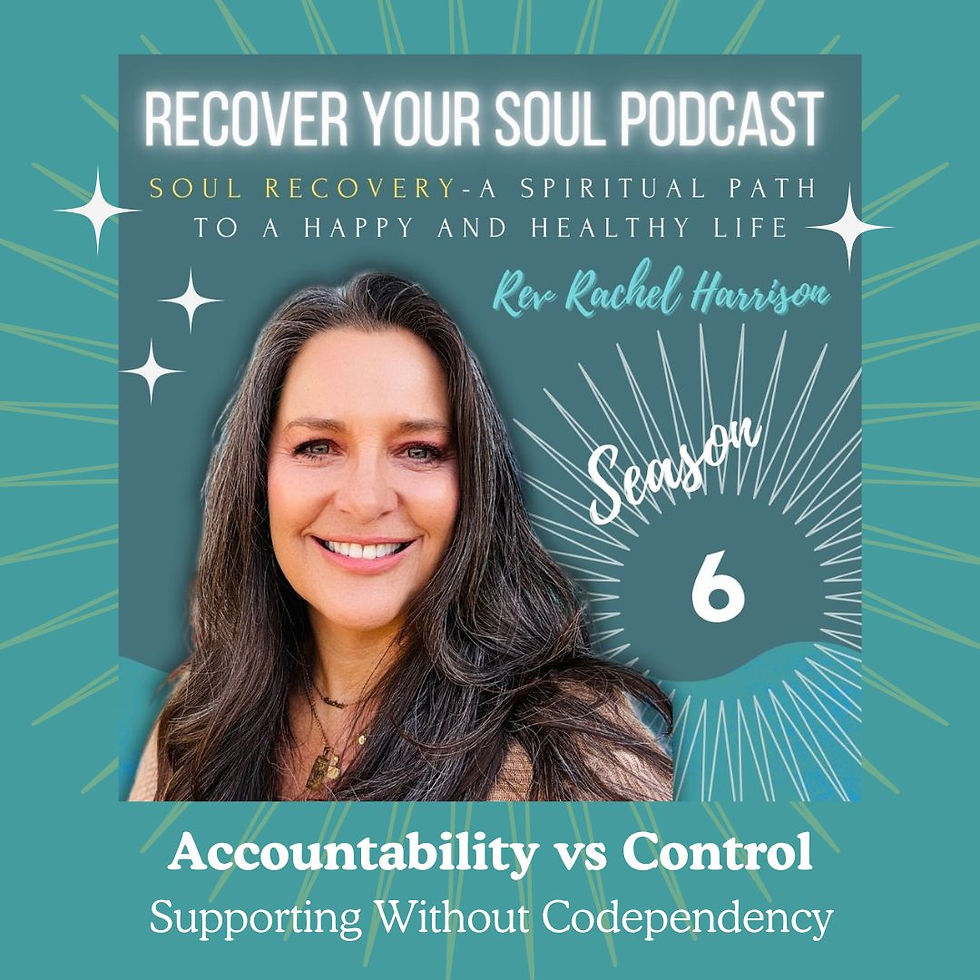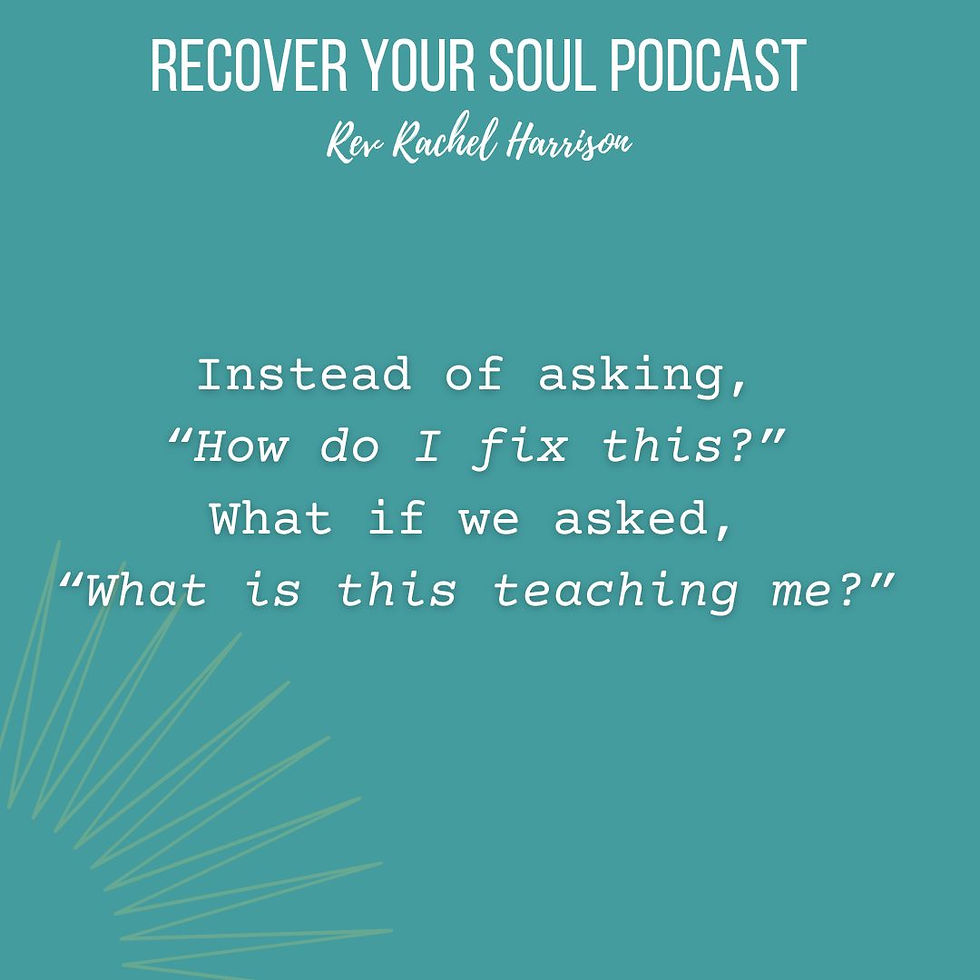Accountability vs. Control: How to Support a Loved One’s Recovery Without Losing Yourself
- Aug 11, 2025
- 4 min read

A thoughtful question from our community sparked this week’s conversation: Can I hold my loved one accountable without slipping into control and codependence?
In her case, a spouse asked whether requiring at-home breathalyzer tests—on top of an interlock—crosses a line. If you’ve wondered the same, you’re not alone. From a Soul Recovery perspective, this is sacred, nuanced ground. We want to help. We want them safe, sober, and thriving. And yet, the core truth of Soul Recovery is that we are powerless over other people and powerful within ourselves. When we forget this, our “helping” can quietly turn into managing, monitoring, and shaming—behaviors that often fuel secrecy and setback rather than healing.
Here’s what I’ve learned on this path. Addiction lives beneath logic. During my drinking years, there were countless days I looked into the mirror—and into my family’s eyes—and meant it when I said, “I’m not going to drink.” And then I drank. That wasn’t about a lack of love or a failure of character; it was the grip of addiction. External policing in those moments would have added more shame to a soul already hurting. Accountability that transforms has to rise from the inside out. What we can do as partners, parents, and friends is shift from controlling to supportive presence—from “prove it to me” to “How can I stand with you in a way that truly helps?”
Accountability vs. Control—A Soul Recovery Snapshot
Supportive accountability is invited, collaborative, and specific. It sounds like: “When you’re in your most right mind, what helps? What kind of check-ins would feel supportive? What words shut you down, and what words lift you up?”
Control is uninvited, rooted in fear, and focused on surveillance. It sounds like: “Blow for me now. Let me see your phone. I’ll make sure you don’t mess up.”
Loving detachment holds clear boundaries without punishment or shame: “I won’t ride in a car if you’ve been drinking,” “I won’t lend money when you’re using,” “If you choose to drink, I will choose to leave the situation.”
Encouragement over interrogation. Celebrate progress (two steps forward, one step back). Be a witness to growth, not a warden of behavior.
A Gentle Mini-Guide You Can Start Today
Pause, Pray, Breathe. Before you react, breathe and reconnect with Spirit. Ask, “What’s mine to do—and what’s not?”
Ask in their most right mind. When they’re steady, co-create a plan: what support they want, what language helps, what boundaries you both honor.
Agree on natural consequences. Not punishment—clarity. “If you drink, I’ll sleep elsewhere.” Follow through consistently and kindly.
Cheerlead, don’t chase. Replace checking up with checking in: “How’s your heart today? Anything you need?” "Good job!"
Do your work. Tend your own Soul Recovery from codependency and control addiction. Join a group, book a session, or work the steps. Your healing changes the whole system.
“What if they don’t want it?”
This is the hardest part to accept: we cannot make someone recover. As I share in the episode—and as many treatment professionals affirm—real change requires a wholehearted “whatever it takes.” Sometimes our attempts to cushion consequences delay the very bottom that inspires commitment. It’s not about abandoning someone; it’s about refusing to abandon yourself. Hold your boundaries with compassion. Stay anchored in your values. Keep your side of the street clean.
A Real-Life Example of Support (Not Control)
I’m currently on a 30-day break from sugar. What helped most wasn’t being policed—it was my husband quietly choosing not to order dessert in front of me and saying, “I’m proud of you.” That simple, shame-free solidarity strengthened my resolve more than any monitoring ever could. Different issue, same principle: support that honors autonomy invites genuine accountability.
Go Deeper With the 9-Step Soul Recovery Process
This post pairs with a two-part podcast exploration.
Part 1 (today): We unpack accountability vs. control and how to practice loving detachment in real life.
Part 2 (Friday’s bonus): A step-by-step walk through the 9-Step Soul Recovery Process applied to this exact dilemma—so you can work it in your journal, with your partner, or alongside your support system. You can listen free on Patreon for the first week or support the show as an Apple Podcasts subscriber.
If You Need Support Right Now
Free Soul Recovery Support Group on Zoom: first Monday of every month.
Work the Steps at your own pace with self-guided modules - Use code WORKSTEPS%50 for 50% off each module.
1:1 Coaching if you want personal guidance through boundaries, detachment, and next steps.
Community: Daily inspiration on Instagram/Facebook and our private Facebook group.
If this tender topic touches your life, I invite you to listen to the full episode and then join me Friday for the deeper dive. Bring your journal, your courage, and your compassion—for them, yes, but most of all for you. We’re walking this path together: learning to let go, remembering our wholeness, and becoming loving witnesses to real change.
Press play, take a breath, and let Soul Recovery lead the way. Together we can do the work that will Recover Your Soul.
Want to learn more? Listen to the full episode - Accountability vs Control: Supporting Without Codependency in Soul Recovery on the Recover Your Soul Podcast on all streaming platforms or on the website.
With Love- Rev Rachel



Comments